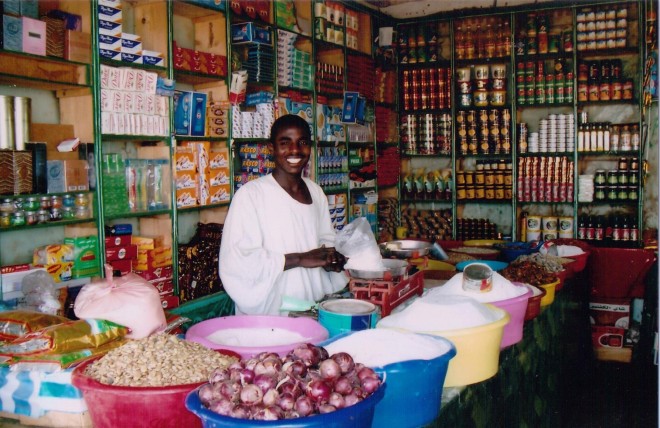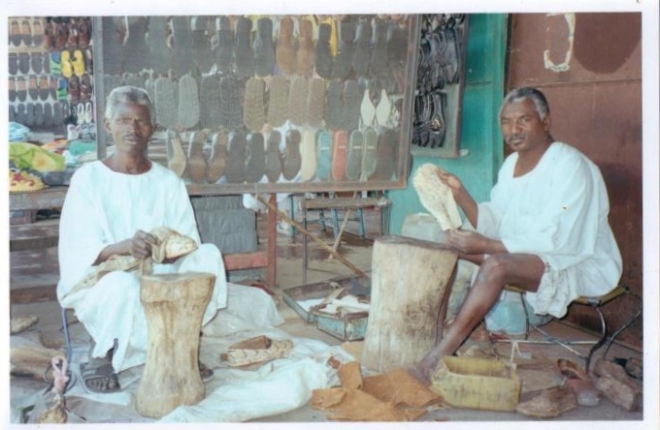While collecting Sudanese folktales it has always struck me how many references there are to the jinn and evil spirits. This traveller’s tale by my husband describes a trek he made through the Jabal Marra mountains shortly before the eruption of the Darfur conflict in 2003. He believes that the strange episode in this story was entirely in his imagination, but I’m not so sure…
“When some of the merchants in the market at Nyala heard that I was going to hike through the mountains alone they expressed concern. “There are lions, leopards and goodness knows what else!” they warned in dark tones. And as it happened, there was a reason later on to remember their warning.”
“Several days into my trek, I reached the floor of the Deriba crater under the ridge of the Jebel Marra mountain. Here horses grazed on the pasture while a troop of baboons entertained me with their quick agility on the steep mountainsides. In the middle of the crater was a salt lake that according to legend would suck into its depths any bird that flew above it. Inwardly I had scoffed at the tale recounted in a geographical article written by British officers who were the first to climb Jebel Marra after the 1916 invasion. However, as I watched the tranquil scene, I noticed that strangely enough there were no birds amongst the trees on the crater’s floor, nor soaring above the rocky mountainsides.
Moving down the mountain, I came to a series of hot sulphur springs next to which I relaxed for some time until the golden rays of late afternoon sunshine warned me that dusk was approaching. I had planned to spend the night at the village of Quaila but according to my map, which was entirely in Russian, it was still some distance away.” “Surprisingly, I was not perturbed at the thought of being benighted on an African mountain despite the chill of the evening air. Surely this is why I had come to Africa in the first place – for an adventure! With the last rays of sunlight, I saw a brown hare scurrying away while from further off came the haunting cry of a jackal. I watched a line of feral donkeys filing their way down into a ravine, their eyes glowing fluorescently in the gathering gloom. Following them, I came to a salt encrusted marsh that I squelched my way across before scrambling up the valley’s side and onto a plateau.”
“Here I saw in the moonlight a row of African houses surrounded by thorn hedges. There was no light coming from any of them so I decided to walk along the settlement’s perimeter in the hope that someone would come out and greet me. To my astonishment, the place was deserted without even the bark or snarl from one of the ferocious dogs that usually guard the Fur homesteads. As I walked back, I began to feel more and more uneasy. Turning round at last I saw that the houses had disappeared! All that now stood in their place were some thorny shrubs…”
“Fortunately, I did find the path down to Quaila, and a couple of hours later found myself standing in the middle of the deserted market place. From the middle of the village I could hear the merriment of a wedding celebration. If there was ever an occasion to gate crash a party, I felt that this was it, especially after my “hallucinations” earlier that evening. Within minutes, I had been seated around a blazing fire and a bowl of warm broth placed in my hands. Afterwards I rolled out my sleeping bag and stared at the stars that looked like jewels in the black night’s sky. Around the flickering fire a sufi chant had begun “la ilaah illa allaah!, la ilaah illa allaah!” (There is no God but God!). I hope that they don’t keep that going all night I thought to myself but within minutes I was lost to the world in the luxurious sleep of the exhausted. My warm reception that night was typical. The rural people of the Sudan justly deserve their reputation for great hospitality. There were numerous times when they offered me, a foreigner and chance-met traveller, a meal or bed for the night.”
“I don’t think I’ll ever forget those two very different villages that I encountered one moonlit night in the Jabal Marra mountains.”
(a traveller’s tale by Edmund Wyatt)



